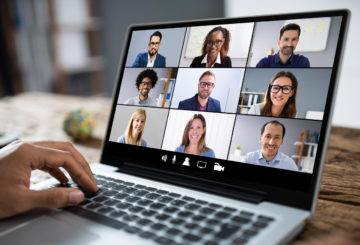
Residents of the United States of America typically idealize and follow a national ethos known as ‘The American Dream,’ a belief that anyone who works hard enough will prosper financially and socially. Indeed, it is a common belief among American citizens that hard work and ingenuity are more significant factors in determining personal success than the possession of a prestigious family name or a renowned university degree. The ‘American Dream’ concept allows Americans the chance to transcend social and financial circumstances to achieve professional success, respect, and elevated social status.
This national ethos of glorifying hard work and material advancement has shaped the United States into one of the most individualistic, profit-focused countries in the world. In his work on cultural dimensions, Professor Geert Hofstede concluded individualism was the most important dimension of American culture. The individualist mindset strongly influences the manner in which businesses function, generating the belief that employees who work long, hard hours and outperform their peers are more likely to be promoted and receive other rewards. Because hard work is so valued by their culture, Americans tend to identify strongly with their professions.
It is important, then, for expats to take their jobs in America as seriously as their American counterparts if they want to be successful. There are a few tips that can make the strain of starting that new job in the U.S. just a little bit easier.
Time Management:
- Normal business hours in the United States extend from 8 or 9 am to 5 or 6 pm, Monday through Friday, and the average American works 7.9 hours per day. Despite these standards, one-quarter of American workers routinely work more than the full-time standard of 40 hours per week.
- New employees often receive only one or two weeks of vacation each year (less than any other industrialized nation except Japan).
- Businesspeople are more likely to work longer hours as they advance to positions of greater responsibility, but they also are likely to receive more vacation time.
- After a few years in a position, it is common for an employee to receive at least three weeks of paid vacation each year, although taking three weeks of vacation at one time is likely to be discouraged in many fast-paced corporate environments.
- Time is considered a valuable commodity in the United States, and it is important to be punctual or a few minutes early to appointments and meetings. Although arriving a few minutes late to an appointment is typically not a problem, it is best to telephone the other participants to alert them about any delays and offer a new estimated time of arrival.
Communication Styles
- American culture is a ‘low-context’ culture, meaning communication is direct, explicit and mostly verbalized. In the US, it is acceptable to deal with conflict openly and directly.
- Americans may criticize ideas, events, and people in public or say ‘no’ without hesitation, which may appear rude or embarrassing to members of other cultures. These candid comments are not intended to be personal attacks but are instead directed toward the topic under discussion and are intended to resolve uncertainties or problems.
- Despite this forthright style of interaction, the ability to tactfully and directly express opinions and perspectives is highly valued.
- Greetings in the United States are brief and involve a minimum of physical contact. A firm but quick handshake, accompanied by a smile and direct eye contact, is typical both as a greeting and as a farewell.
Office Protocol
- Because individualism is such a central concept in the United States, independence and self-reliance are highly valued in the workplace. Workers are expected to perform tasks with little supervision, and career advancement is based on performance and personal achievements in the workplace.
- American office workers attempt to create an equal environment by frequently declining to use professional titles at the office and preferring to address colleagues by their first names.
- If you wish to have a meeting or a discussion with a businessperson, you usually will be required to schedule the appointment or meeting in advance.
- You are expected to arrive at business engagements on time, whether these meetings are held at an office or at a lunch or dinner meeting. Tardiness is frowned upon, although you can reduce the social damage of your delay by calling the hosts before the event or meeting to alert them that you will be late. You should offer your hosts an explanation for the tardiness, and estimate a new arrival time.
- Professional dress codes vary significantly across the United States. Business attire tends to be more formal on the East Coast than it is on the West Coast. People who work in rural areas, or in extremely warm climates such as Phoenix, Arizona, dress less formally than individuals employed in metropolitan areas or in colder climates (such as New York City).
- Most executives in the United States wear suits. Female executives wear dress suits or pantsuits, often with accessories. Appropriate dress also varies among industries, with employees in heavily regulated fields, such as banking, tending to dress more formally than is typical in fields with fewer regulations, such as computer programming and graphic design.
- American co-workers often become close friends, but many offices discourage romantic relationships among co-workers — especially between managers and subordinates or members of the same department. Employees interested in entering a romantic relationship with a co-worker should be aware of the company’s regulations about office relationships and should respect the established rules.
- Americans enjoy laughter and joking, even in the office. They appreciate a good sense of humor, as long as it is tasteful (according to American standards). Ethnic, racial and religious jokes are not appreciated, but self-deprecating humor is usually well-received.
- American workers typically eat their lunches from noon to 1 pm. Some companies have strict rules against drinking alcoholic beverages at lunch, while others do not. Co-workers usually split the bill when they are dining together at a restaurant. Many workers purchase their lunches from a local restaurant or staff cafeteria, though some employees bring meals prepared from their home.
Follow @goinglobal
Tweet to @goinglobal
Information on employment outlook for more countries can be found by logging into your GoinGlobal account!
Don’t have an account? Sign up for a free online demo to learn how you can utilize GoinGlobal’s employment resources.



